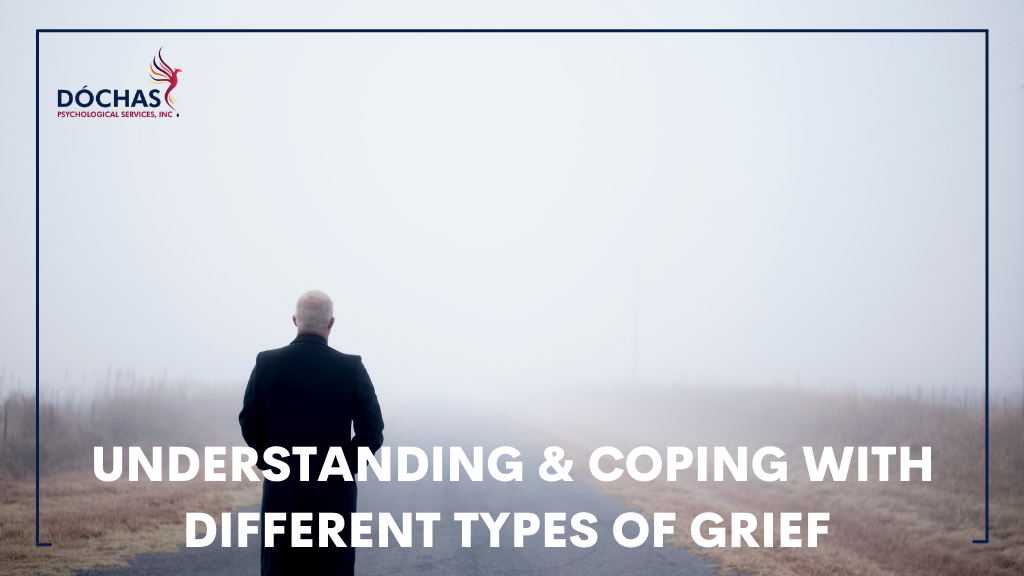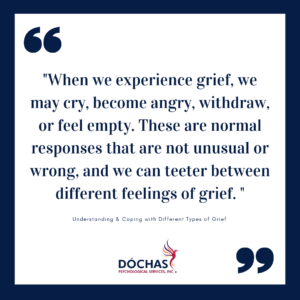Hey, it’s Justine here on the Dóchas blog, and this week’s blog is about the different types of grief and some tips to help you cope with them.
Wikipedia defines grief as “The response to loss, particularly to the loss of someone or some living thing that has died, to which a bond or affection was formed. Although conventionally focused on the emotional response to loss, grief also has physical, cognitive, behavioural, social, cultural, spiritual, and philosophical dimensions.”
Not only can grief be experienced in our thoughts, emotions, bodies, and behaviours, but it presents itself differently for everyone, and healing through grief is not linear.
Experience Of Grief
We all have or will experience grief at some point in our lives, and we will consequently experience various emotions alongside our grief. We experience grief following the death of a loved one, a pet, the loss of a job, the end of a relationship, or the transitioning of a particular phase in our lives. Grief can be complex and abstract (don’t worry, I’ll explain these terms) and can cause a wide range of confusing emotions. When we experience grief, we may cry, become angry, withdraw, or feel empty. These are normal responses that are not unusual or wrong, and we can teeter between different feelings of grief. For example, we might experience less sadness after some time has passed since we lost someone we care about, but we may also revert to feeling sad, angry, resentful, or all of these at once! This is also not unusual because grief is a complex and personal process. To make things even more complicated, we can love someone and grieve them simultaneously.

Different Types of Grief
Typical Grief:
According to What’s Your Grief, “There is no ‘typical’ or ‘average’ grief. There are no timelines, and grief experiences generally vary from one individual to another. ‘Normal Grief’ simply refers to a grief response that falls under an extremely broad umbrella of predictability. However, ‘Normal Grief’ is marked by movement towards acceptance of the loss and a gradual alleviation of the symptoms, as well as the ability to continue to engage in basic daily activities.”
Grief may include experiencing different emotions, thoughts, and physical reactions in response to the death of a loved one or the loss of a job or relationship.
Anticipatory Grief:
What’s Your Grief defines anticipatory grief as, “The reaction to a death you were able to anticipate, such as when an individual dies from a long-term illness. You begin grieving as soon as you accept and understand that someone you love will die.”
Grief that occurs while experiencing a loss can be confusing, as you may feel conflicted or guilty for experiencing grief reactions about someone who is still here. You may experience anger, loss of emotional control, and helplessness. You may also feel grief over the loss of things other than the individual, such as the loss of hopes and dreams for the future and the loss associated with changing roles and family structures.
Ambiguous Grief:
According to Faith By Grace, “Not every loss we experience is tangible. Some losses are abstract or perceived…You may have been dreaming of or hoping for something for a long time. You may have been planning and preparing for a family, a relationship, a career, an event, a degree, a purchase, or even an adventure that may never occur, or the loss of safety after a traumatic event. These are real losses, even though they are not as tangible as others.”
Tips For Coping with Grief:
Normalize, don’t minimize your experience. Faith By Grace explains, “Even in a good situation, like healing, there can be a need to let yourself grieve something you’ve lost. Remember, your loss doesn’t have to be tangible in order to warrant the need for grieving. When we lose something very meaningful to us that we only perceived we had, it can be a real loss. It is so easy to discount the need to process a loss that is intangible. It isn’t even a “real” thing! The problem with discounting these losses is that it establishes a pattern of denial that may eventually be applied to the tangible losses as well. The pain and hurt from a loss that you have experienced, but not processed, can keep you from grieving new losses.”
Check-in with yourself and acknowledge your symptoms of grief. Confronting these abstract losses is important. In these losses, the enemy can sneak in lies like, “This shouldn’t bother you” or “This isn’t important.” It is so easy to discount the need to process a loss that is intangible. It isn’t even a “real” thing! The problem with discounting these losses is that it establishes a pattern of denial that may eventually be applied to tangible losses as well. The pain and hurt from a loss that you have experienced but not processed.
This grief can build up and eventually reach a breaking point that will cause collateral damage to your life and your relationships. This might look like acknowledging feelings of sadness, anger, resentment, distressing or uncomfortable thoughts, and physical reactions and then using healthy ways of coping with these emotions and, if it feels right, expressing them in relationships where we both love and experience grief at the same time.
Seek support from people you love and trust. Connect with others whom you feel safe with when you’re going through the motions of grief. According to clinical psychologist Dr. Dan Siegel, naming our emotions is beneficial for two reasons. Naming our emotional experience can reduce the intensity or “charge” of emotion in our brain while also helping us become aware of our emotions to process them and reflect on how to move forward.

I hope you found this information to be helpful! If you or a loved one is really struggling with the grieving process or if you just want to check in to ask questions about loss, I encourage you to ask us how we can help. You can contact us here by calling us at 780 446 0300 or emailing info@dochaspsychologicalservices.com.
About Dóchas Psychological
Dóchas Psychological Services is a well-established and trusted therapy clinic located in Spruce Grove, Alberta. At Dóchas we value the idea that everyone deserves a safe space. Through connection and education, our team works hard to build a trustworthy relationship with each of our clients. It is our goal to create a community for our clients to feel like they belong.
Disclaimer
Information provided through Dóchas Psychological Services blogs or vlogs is meant for educational purposes only. They are NOT medical or mental health advice. You can read more about our disclaimer here.


